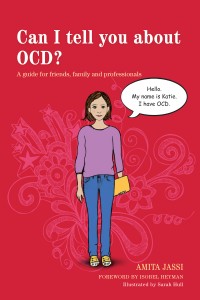 Amita Jassi, author of ‘Can I tell you about OCD?’ explains some of the common obsessions and compulsions experienced by people with the disorder and how this could effect children at school.
Amita Jassi, author of ‘Can I tell you about OCD?’ explains some of the common obsessions and compulsions experienced by people with the disorder and how this could effect children at school.
OCD is an anxiety disorder characterised by unpleasant and recurring thoughts, images, doubts or urges (called obsessions) and repetitive and irrational behaviours (called compulsions). Compulsions, also known as rituals, may be observable behaviours (such as washing or tapping) or mental rituals (such as thinking a good thought to cancel out a bad thought). Compulsions are usually carried out as a way of reducing the distress caused by obsessions. OCD takes many different forms and can range from mild to severe. When children are troubled by OCD they can experience very high levels of anxiety and distress and find that it can take up a lot of their time.
Some common obsessions are:
- Fears about dirt or contamination
- Worries about harm coming to yourself or others
- Unwanted sexual thoughts
- Thoughts about doing something forbidden or embarrassing
- Discomfort if things are not symmetrical or even
- Needing to tell, ask or confess
- Fears of losing important things
Some common compulsions are:
- Checking things over and over again
- Touching or tapping things
- Seeking reassurance
- Hoarding or collecting things that are useless
- Arranging things so that they are ‘just right’
- Washing and cleaning
- Counting, repeating and re-doing things
The good news is that OCD can be successfully treated and recent evidence shows that the sooner it is tackled the better the treatment outcomes are likely to be. The recommended treatment for OCD by the Department of Health is a talking therapy called Cognitive Behaviour Therapy (CBT). It is also recognised that some children may also benefit from treatment with medication from the group called selective serotonin re-uptake inhibitors (or SSRIs). It is clear therefore that young people should not have to struggle with OCD without any support and treatment. The UK’s largest charity for OCD, OCD Action, wants young people, their parents and their school to take action now.
What are the signs of OCD at School?
OCD can affect many areas of a young person’s life, including school life. It is important to remember that OCD affects people in many ways however some of the signs that you may observe in school include:
- Poor attention and concentration due to distraction from unwanted thoughts or the need to perform rituals
- Extreme tiredness due to being up late at night doing rituals or the overall exhaustion caused by the constant battle with OCD
- Frequent or prolonged toilet visits due to completing cleaning rituals
- An inability to touch objects, materials or other people due to possible contamination fears
- Excessive questioning and need for reassurance
- Messy work due to having to repeat rituals such as rewriting or erasing words
- Repeated lateness as a result of being delayed by rituals
- Late handing in work due to being slowed down by obsessions and/or compulsions
- Arranging items on a desk, shelf or classroom so that objects are aligned
- Repetitive behaviours such as getting up and down from a desk or opening and closing the door
- Low self-esteem and difficulty with peer relationships
- Reduction in grades or decline in school performance
It may also be helpful to be aware that OCD can be associated with other disorders such as depression, Attention Deficit Hyperactivity Disorder (ADHD), Autism Spectrum Disorders (ASDs) and Tourette Syndrome.
Where else can I find information about OCD?
For more information on OCD and young people, see ‘Can I tell you about OCD?’ or refer to the OCD Action website: www.ocdaction.org.uk or OCD-UK: www.ocduk.org
One thought